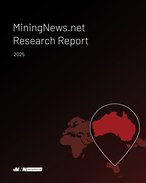This article is 2 years old. Images might not display.
December quarter gold output exceeds previous best
This article is 2 years old. Images might not display.

The MNN Research Report 2025 provides insights into critical mining themes in Australia/Oceania, including top projects, C-suite priorities, risk, ESG performance and investor sentiment.

Exclusive insights into the plans, priorities and preferences of 130+ mining investors and top factors influencing investment decisions in 2025.

A detailed analysis of mining investment risks across 117 jurisdictions globally, assessed across six risk categories and an industrywide survey.

The Mining Company ESG Index report provides an in-depth evaluation of ESG performance of 61 of the world's largest mining companies. Using a robust framework, it assesses each company across 9 meticulously weighted indicators within 6 essential pillars.